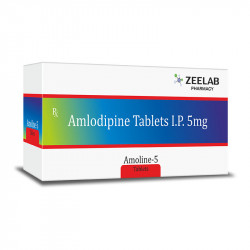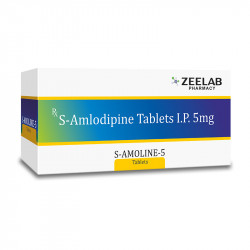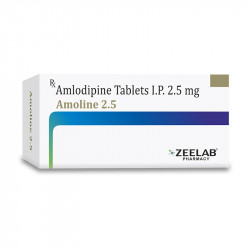Amlodipine
Introduction
Amlodipine is a medication commonly prescribed for high blood pressure (hypertension) and chest pain (angina). It belongs to the class of calcium channel blockers and works by relaxing blood vessels, improving blood flow, and reducing strain on the heart. By helping to lower blood pressure, it reduces the risk of heart attacks, strokes, and kidney problems. Amlodipine is effective, easy to use, and usually taken once a day for optimal control of blood pressure and heart health.
Uses of Amlodipine
- Treatment of high blood pressure (hypertension).
- Relieves chest pain (angina) caused by reduced blood flow to the heart.
- Helps prevent strokes, heart attacks, and kidney problems in people with high blood pressure.
- Improves circulation in patients with coronary artery disease.
How Amlodipine Works
Amlodipine works by blocking calcium from entering heart and blood vessel cells. This relaxes and widens the blood vessels, allowing for better blood flow, which lowers blood pressure and reduces the workload on the heart.
Benefits of Amlodipine
- Effectively lowers high blood pressure.
- Reduces the risk of heart-related complications like heart attacks and strokes.
- Alleviates chest pain associated with angina.
- Improves overall cardiovascular health.
How to Take Amlodipine
Amlodipine is usually taken once a day, with or without food. It is important to follow the prescribed dosage provided by your doctor and avoid adjusting the dose on your own. Do not skip doses, and take the medication at the same time each day for best results. Regular blood pressure monitoring is recommended during treatment.
Side Effects of Amlodipine
- Common side effects include swelling in the ankles or feet, dizziness, and headaches.
- Less common side effects include irregular heartbeats, fatigue, and nausea.
- In rare cases, it may cause low blood pressure, chest pain, or fainting.
Safety Advice
- Avoid drinking alcohol, as it can enhance the side effects of Amlodipine.
- Consult your doctor if you are pregnant, planning to become pregnant, or breastfeeding.
- Let your healthcare provider know if you have liver, kidney, or heart problems.
- Do not drive or operate heavy machinery if you experience dizziness or lightheadedness.
Frequently Asked Questions (FAQs)
Q: What is Amlodipine used for?
A: Amlodipine is used to treat high blood pressure and chest pain (angina). It helps prevent heart attacks, strokes, and kidney problems in people with hypertension.
Q: How long does it take for Amlodipine to work?
A: Amlodipine may start lowering blood pressure within a few hours, but it can take up to two weeks to experience the full benefits.
Q: Can I stop taking Amlodipine if I feel better?
A: No, it’s important to continue taking Amlodipine as prescribed. Consult your doctor before making any changes to your medication regimen.
Q: Are there any side effects of Amlodipine?
A: Common side effects include swelling, dizziness, and headaches. Rarely, it may cause more serious effects like chest pain or an irregular heartbeat. Contact your doctor if you experience unusual symptoms.
Q: Can I drink alcohol while taking Amlodipine?
A: It is advised to avoid alcohol while taking Amlodipine, as it can increase side effects like dizziness and lightheadedness.
Download India's most affordable pharmacy app
- Compare with medicine prices
- Save upto 90% on your medicine bills

Temperature Controlled storage and delivery

Regular Sanitization

Disinfected Packaging


















 Added!
Added!